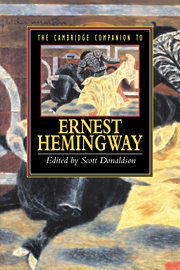Book contents
- Frontmatter
- 1 Introduction
- 2 Hemingway's journalism and the realist dilemma
- 3 1924
- 4 In Our Time, out of season
- 5 Brett and the other women in The Sun Also Rises
- 6 A Farewell to Arms
- 7 Hemingway's late fiction
- 8 Hemingway and politics
- 9 Hemingway and gender history
- 10 Hemingway, Hadley, and Paris
- 11 Hemingway's Spanish sensibility
- 12 The Cuban context of The Old Man and the Sea
- 13 Conclusion
- Selected Bibliography
- Index
- Series List
7 - Hemingway's late fiction
Breaking new ground
Published online by Cambridge University Press: 28 May 2006
- Frontmatter
- 1 Introduction
- 2 Hemingway's journalism and the realist dilemma
- 3 1924
- 4 In Our Time, out of season
- 5 Brett and the other women in The Sun Also Rises
- 6 A Farewell to Arms
- 7 Hemingway's late fiction
- 8 Hemingway and politics
- 9 Hemingway and gender history
- 10 Hemingway, Hadley, and Paris
- 11 Hemingway's Spanish sensibility
- 12 The Cuban context of The Old Man and the Sea
- 13 Conclusion
- Selected Bibliography
- Index
- Series List
Summary
When he returned to Cuba after World War II, Ernest Hemingway faced the necessity of resurrecting his moribund literary career. He had closed out the 1930s with a triumphant novel about the Spanish civil war, confounding the critics who had declared his career to be over. But during World War II he had forsaken his art to serve as a Collier's correspondent - although he had actually published only six dispatches - and had confined his literary efforts to two long free verse poems written to Mary Welsh, whom he married in 1946. It was time to return to his real vocation.
Hemingway could not mark his return to letters by writing a mere journeyman novel or a few stories reminiscent of his prewar work. As he would observe in 1954, a writer of a certain standing had to strive continuously to push beyond his previous limits:
For a true writer each book should be a new beginning where he tries again for something that is beyond attainment. He should always try for something that has never been done or that others have tried and failed. Then sometimes, with great luck, he will succeed.
How simple the writing of literature would be if it were only necessary to write in another way what has been well written. It is because we have had such great writers in the past that a writer is driven far out past where he can go, out to where no one can help him.
- Type
- Chapter
- Information
- The Cambridge Companion to Hemingway , pp. 128 - 148Publisher: Cambridge University PressPrint publication year: 1996

